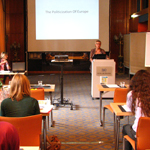The Politicization Of Europe: The Emergence Of An European Ideology
-
-

-
Presentation speakers
- Liljana Siljanovska and Vlera Ejupi, South East European University
- Download presentation
Abstract:
The European documents are standardized as criteria and they generate politicized values especially in the candidate countries for membership in the EU. This situation, without established solutions in practice, generates a phenomenon of creating an ideology of the EU. The present paper attempts to follow an analytical line of such a trend in the Republic of Macedonia within the processes of Eurointegration. In Macedonia exists a general consensus of the Government, political elites, and the citizens for their membership in the EU. Comparative analysis of the public opinion concerning the eurointegrational processes show that the euro – trend in Macedonia was beginning in 2003, and was in expansion in 2005. The increasing line in percentage on the euro – consciousness shows that the support of the citizens of Macedonia to enter the EU in 2003 is 88.9%, in 2004 – 89%, in 2005 there is a significant increase of 91.9%, while in 2010 there is a small decrease of about 88%. The national, political and ethnical consensus for membership in the EU, turns into a new ideology which tends to transform into a European dogma: the membership in the EU is accepted as an undebatable truth which should not be challenged The small number of the citizens which are against membership, are looked upon by the society as destroyers of the European dogma. The following question is here asked: is the Republic of Macedonia entering into a new mono ideology when it comes to its strategic decision, as in the time of Stalinism, or is it an option and a tendency toward the European standards offering a better life for the citizens? The idea of membership in the EU would take other dimensions if Macedonia were Switzerland or Norway. In Macedonia there is not a very strong euro- scepticism, because people see a perspective of self maintenance by being inside the borders of the EU and NATO. -
Related Presentations

Development Of Environmental Infrastructure In The EU: Possibilities For Evaluation
- Jurijs Spiridonovs

From Universalism To Regionalism: Europeanization And Its Reflections Upon Turkey
- Cemile Arikoglu Unducu




















